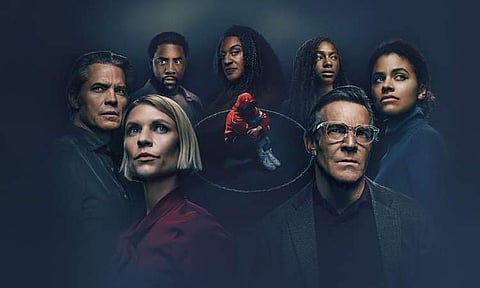Full Circle Series Review: Soderbergh evokes, successfully the mood of 70s crime cinema
Rating:(4 / 5)
I could list various reasons for taking delight in the existence of a filmmaker like Steven Soderbergh. Wait, scratch that: there is no one like him today. He began as one of Hollywood's unparalleled, singular forces in the indie film scene and continues to remain so. Is there anyone as prolific as him? The man works fast, brings out one film after another, one series after another, without skimping on the quality -- well, most of the time -- in such a short span. There is no 'weak' Soderbergh effort in my book. Despite the stark minimalism and unifying style that marks most of his filmography, Soderbergh finds something interesting to do in all of them.
Director: Steven Soderbergh
Cast: Timothy Olyphant, Zazie Beetz, Claire Danes, CH Pounder, Dennis Quaid
Streamer: Jio Cinema
His latest series, Full Circle, sees him reuniting with Ed Solomon, who wrote a recent terrific Soderbergh film, No Sudden Move. What makes their collaboration so special is their ability to bring back the goodness, the gritty realism of some of the most acclaimed crime films of the 60s and 70s. We can see it in No Sudden Move, and we can see it in Full Circle. I remembered great examples like The Friends of Eddie Coyle and Charley Varrick, and when a film does that to me, I know I'm in good company.
One can see why the material of the six-episode miniseries, streaming on Jio Cinema, appealed to Soderbergh. It packs plenty of attention-grabbing characters, with their connections to each other not immediately apparent. Some we see, others we don't; sometimes, they extend to other parts of the globe in an intricate screenplay that brings to mind Soderbergh's multiple Academy Award-winning drug war drama, Traffic (2000), or the virus outbreak thriller, Contagion (2011).
Midway through the series, a prime member of an organised crime syndicate with multiracial roots expresses concern to his aunt and matriarch, Savitri Mahabir (CH Pounder). They've just kidnapped somebody, but the plan isn't moving as intended. When things get slightly hot under the collar, Savitri learns that select members find the whole objective slightly frustrating because they only know bits and pieces of what is going on. They want to understand the 'big picture', which Savitri isn't willing to draw for them yet. She wants them to be patient and do what they get paid to.
Full Circle functions similarly, with everything slowly coming to focus only later. Soderbergh's way of showing us information is such that it requires everyone to pay close attention to all the details. And despite Soderbergh's admirable penchant for the cinema verite approach, Full Circle requires you to be mindful of everything inside a frame instead of being concerned with whether that frame is mobile or stationary. Because, I assure you, patient viewers should have no problem keeping track of every character and plot strand. The fact that Full Circle has borrowed a small idea from Akira Kurosawa's High and Low (essential viewing!) is already known, but that development is confined only to the pilot. Every succeeding event is original. Everything revolves, after all, around multiple families, their attempts to survive and to keep past secrets from bubbling up to the surface.
No one is 'pure', even the smart-talking, extremely determined lesbian female cop Mel Harmony (Zazie Beetz), who jeopardises her relationship with her partner while pursuing a case with which she is obsessed. She, too, has an unpleasant history, like every other character in Full Circle, especially Samantha Browne (Claire Danes), Derek's wife. And when you throw in Savitri, a superstitious matriarch who resorts to black magic to protect her family, it opens up the possibility for dark humour.
CH Pounder plays Savitri as a misguided, deluded woman making unreasonable demands, who talks to the picture of her dead husband, who conceals a chilling personality under a put-upon smile. Even when things go wrong, she believes it to be merely a 'corrective' step that heralds the arrival of a better outcome. "Why did she insist on arranging the rendezvous at 1.11 am?" asks her baffled nephew Aked (Jharrel Jerome) at one point. And the 'circle' in the title is there for a reason. It's closely tied with Savitri's beliefs. The ransom money, for instance, can be rounded to 3.14 (Pi). Of course, the other 'circle' refers to the decades-long repercussions of past choices trickling down slowly.
On the opposite side, there is the kidnapped boy's grandfather, a renowned chef, Jeff (Dennis Quaid), who wonders aloud why this is happening to his family despite the many philanthropic gestures he did, to which his son-in-law Derek (Timothy Olyphant) replies that the existence of someone who simply wants to hate you is enough; no amount of charity can change that. The other Soderbergh signatures show up, most notably, in the form of unlikely humour in the middle of a tense situation, such as a fan asking Jeff for an autograph and another character asking, in disbelief, "how these popular guys do it." I don't remember Dennis Quaid being this funny before.
Besides the vintage crime dramas it evokes, Full Circle also brings back the atmosphere of 70s conspiracy thrillers such as All the President's Men and The Conversation, and one strong factor responsible for such a recollection is Zack Ryan's menace-inducing score heavy on piano and violin. One can say the same for how Soderbergh conjures up suspense in crucial situations, such as the kidnappers' scheduled rendezvous point, strongly reminiscent of the opening surveillance operation in The Conversation. And Soderbergh's camera work, under his usual pseudonym Peter Andrews, brings the necessary degree of urgency with considerable use of a handheld, fly-on-the-wall approach that puts the viewer in the middle of the action, similar to Michael Mann's method in films such as Collateral and The Insider.

